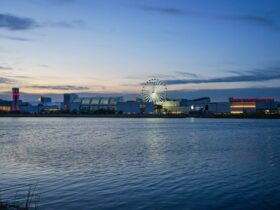Now that it has been winter for the past few weeks, the weather has continued to get colder and colder, leading many to waste more energy and consequently money trying to stay comfortable and warm. With many different expenses including groceries and rent rising, it is important to reduce your spending in other areas.
“Natural gas is widely used by New Jersey customers and remains more affordable than many alternatives,” said Brian Clark, Vice President of Gas Operations at PSE&G. “In fact, we lowered natural gas rates three times in 2023, keeping our customers’ needs in mind.”
PSE&G’s Gas System Modernization Program helps to modernize important infrastructure and enhance safety by upgrading pipes. This also promotes the use of high efficiency appliances and the prevention of methane leaks.
Below you will be able to find tips from PSE&G themselves on how you can save money while also creating a safer and less energy-consuming environment around yourself.
Safety:
Whether it’s melting snow or fast rainstorms, New Jersey has experienced increased floods and it’s also important to familiarize yourself with flood safety, including how to recognize an overheated or “runaway” boiler.
All customers can take steps to improve energy efficiency and safety in their homes, including the following:
- If you smell a gas odor, immediately exit the building, move at least 350 feet away and call PSE&G at 1-800-880-PSEG (7734) OR Call 911.
- Since you tend to use your gas appliances more in the winter, it’s particularly important to monitor carbon monoxide levels in your home. Watch these Facts from the Field video tips on getting a carbon monoxide detector and the best way to use your detector. Also, to prevent carbon monoxide poisoning, do not run any gasoline-powered generators in a garage or any other enclosed space.
- When cooking or baking, never block the vents in the bottom of your oven by lining them with foil or oven protectors as blocked vents can cause carbon monoxide accumulation. There are also signs that your oven needs servicing.
- When it snows, keep any high-efficiency furnace pipes on the outside of your home clear of snow – otherwise, you may inadvertently allow carbon monoxide to build up in your home. Also clear chimneys and vents for other gas appliances.
- Accumulation of ice or snow can interfere with the proper operation of your gas metering system. The meter assembly may contain a regulator that is designed to safely release pressurized gas in the event of a malfunction. Blocking the regulator vent could create an unsafe condition where gas is not able to escape from internal piping.
- Snow and ice can damage gas meters and piping. Be careful when removing snow from around the gas meter; any damage to the gas meter could potentially create a possible leak hazard.
- Use a broom to keep the gas meter, pressure regulator, and vent piping clear of snow and ice during the winter season.
- Chimneys and vents should be protected using an approved cap or screen to keep small animals or insects from entering. These pests have been known to build nests inside chimneys or vents and can cause potentially hazardous conditions.
- Inspect and clean dryer vents to ensure they are clear of debris, lint and condensation, which can become a fire hazard especially in the winter when drying heavier clothing and bedding.
- If you’re installing new gas appliances, change the connectors as well to prevent leaks and use safer, more modern materials.
- If you have an old water heater, consider replacing it. You can also place a water sensor near your heating device.
- Do not store propane tanks or any other highly flammable gas/liquid in your home, as they can become extremely hazardous in the event of a fire.
- Downed wires should always be considered “live.” Stay at least 30 feet away from downed lines, and don’t go near the pole or anything touching the line. Immediately contact PSE&G, at 1-800-436-PSEG (7734) via mobile app or our website, to report downed wires and dial 911 if an immediate hazard exists.
- Electric current passes easily through water, so stay away from downed power lines and electrical wires. Don’t drive over – and don’t stand near – downed power lines.
- Downed wires can potentially be hidden in standing water and snow. If you encounter large pools of standing water, stop, back up and choose another path.
- If you are on life-sustaining medical equipment, ensure that you alert PSE&G in advance and notify your local police and fire departments. For more information, visit www.pseg.com/life.
- For storm safety tips, see https://nj.pseg.com/safetyandreliability/stormsafety.
Saving Energy & Money:
- Locate your thermostat and ensure the vents in that room are open, otherwise the room may be colder than other parts of your house and keep your heat running.
- Before calling for repair service when you have no heat, perform this self-check: 1) is the thermostat on, with working batteries if it is digital? Is the thermostat in heat mode? 2) Is the gas burner emergency switch up or on? If not, switch it on. (It usually looks like a light switch with a red casing.) 3) Do you have a dirty or clogged furnace filter? If so, change the filter.
- If you do not have heat, allow faucets to drip to avoid frozen pipes and costly repairs.
- Also consider getting a free and quick home energy audit.
For more savings tips, see https://nj.pseg.com/saveenergyandmoney/energysavingpage/energytips.













